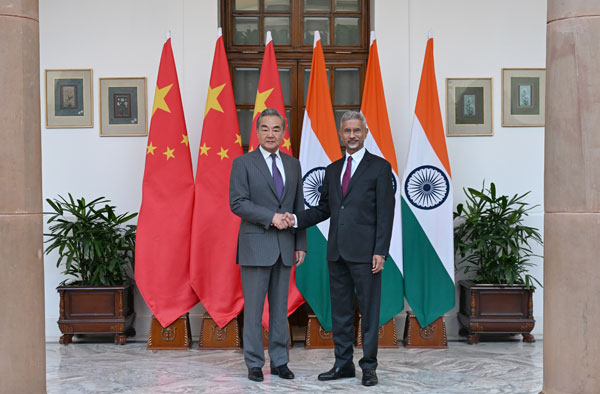Says differences must not become disputes nor competition turn into conflict.
NEW DELHI: External Affairs Minister Dr. S. Jaishankar met his Chinese counterpart, Wang Yi in New Delhi.
During the meeting, Jaishankar said “This occasion provides us an opportunity to meet and review our bilateral ties. It is also an appropriate time to exchange views on the global situation and some issues of mutual interest."
He further added: Having seen a difficult period in our relationship, our two nations now seek to move ahead. This requires a candid and constructive approach from both sides.
In that endeavour, we must be guided by the three mutuals — mutual respect, mutual sensitivity, and mutual interest. Differences must not become disputes, nor competition turn into conflict, Jaishankar added.
Today, our talks will cover economic and trade issues, pilgrimages, people-to-people contacts, river data sharing, border trade, connectivity, and bilateral exchanges. I would like to follow up on some particular concerns that I had brought up with you, Excellency, when I visited China in July.
Wang Yi remarked that the world is undergoing profound and rapid changes, with rising unilateralism, protectionism, and challenges to the multilateral trading system and international order. As the United Nations marks its 80th anniversary, humanity stands at a critical juncture. He emphasized that as the two largest developing countries, China and India—home to over 2.8 billion people—should demonstrate global responsibility, act as major powers, and set an example for other developing nations by promoting unity, contributing to a multipolar world, and supporting greater democracy in international relations.
Wang highlighted the importance of the recent meeting between President Xi Jinping and Prime Minister Narendra Modi in Kazan, which provided strategic direction for revitalizing China-India relations. He noted that both sides have been implementing the leaders' consensus, steadily resuming exchanges at various levels, maintaining peace and stability along border areas, and facilitating the resumption of Indian pilgrimages to sacred sites in China’s Xizang region. These efforts, he said, reflect a positive shift toward restoring the bilateral relationship to its main track of cooperation.
Jaishankar affirmed that under the strategic leadership of their respective leaders, India-China relations have emerged from a low point and are steadily improving. Exchanges and cooperation across various sectors are progressing toward normalization. He expressed appreciation for China’s assistance in facilitating Indian pilgrims’ visits to sacred sites in Xizang.
Jaishankar emphasized the importance of improving mutual strategic understanding, noting that as the two largest developing nations, India and China share commitments to multilateralism and the promotion of a fair, balanced, and multipolar global order. He highlighted the need for both countries to work together to safeguard global economic stability, and stressed that a stable, cooperative, and forward-looking relationship serves the fundamental interests of both sides.


